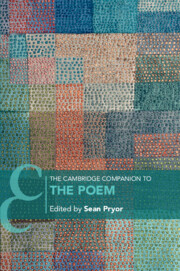Book contents
- The Cambridge Companion to the Poem
- The Cambridge Companion to the Poem
- Copyright page
- Contents
- Figures
- Contributors
- Acknowledgments
- Chronology
- Introduction
- Part I Ideas of the Poem
- 1 Singularity
- 2 Genre
- 3 Poem/Song
- 4 Poem/Novel
- 5 Poem/Concept
- 6 The Poem in Translation
- Part II Forms of the Poem
- Part III The Poem in the World
- Further Reading
- Index
- Cambridge Companions To …
3 - Poem/Song
from Part I - Ideas of the Poem
Published online by Cambridge University Press: 30 May 2024
- The Cambridge Companion to the Poem
- The Cambridge Companion to the Poem
- Copyright page
- Contents
- Figures
- Contributors
- Acknowledgments
- Chronology
- Introduction
- Part I Ideas of the Poem
- 1 Singularity
- 2 Genre
- 3 Poem/Song
- 4 Poem/Novel
- 5 Poem/Concept
- 6 The Poem in Translation
- Part II Forms of the Poem
- Part III The Poem in the World
- Further Reading
- Index
- Cambridge Companions To …
Summary
This chapter explores the link between poem and song by examining the relationship between texts of poems, their metrical properties, their performance modes, and their musical settings. Mikhail Bakhtin's notion of choral support as an element of lyric and Michael Silverstein's analysis of metricalization in ritual serve as the main theoretical reference points. The chapter draws a distinction between, on the one hand, varieties of lyric that retain a historical link to song (such as Ancient Greek stanzaic forms of melos or the East Slavic chastushka) and, on the other, poems that evoke a potential sung performance, often as an invitation to set these poems to music (e.g., Schiller's “An die Freude”). The chapter then considers the political significance of collectively sung lyric with reference to the modern European revolutionary tradition, concluding with an examination of Fyodor Chaliapin's spontaneous performance of “Dubinushka” in Kiev in 1905. The formal properties of this working-class song, whose authors and origin are obscure but whose refrain was familiar to most audience members, contributed to a scene of secular social effervescence.
- Type
- Chapter
- Information
- The Cambridge Companion to the Poem , pp. 49 - 66Publisher: Cambridge University PressPrint publication year: 2024

